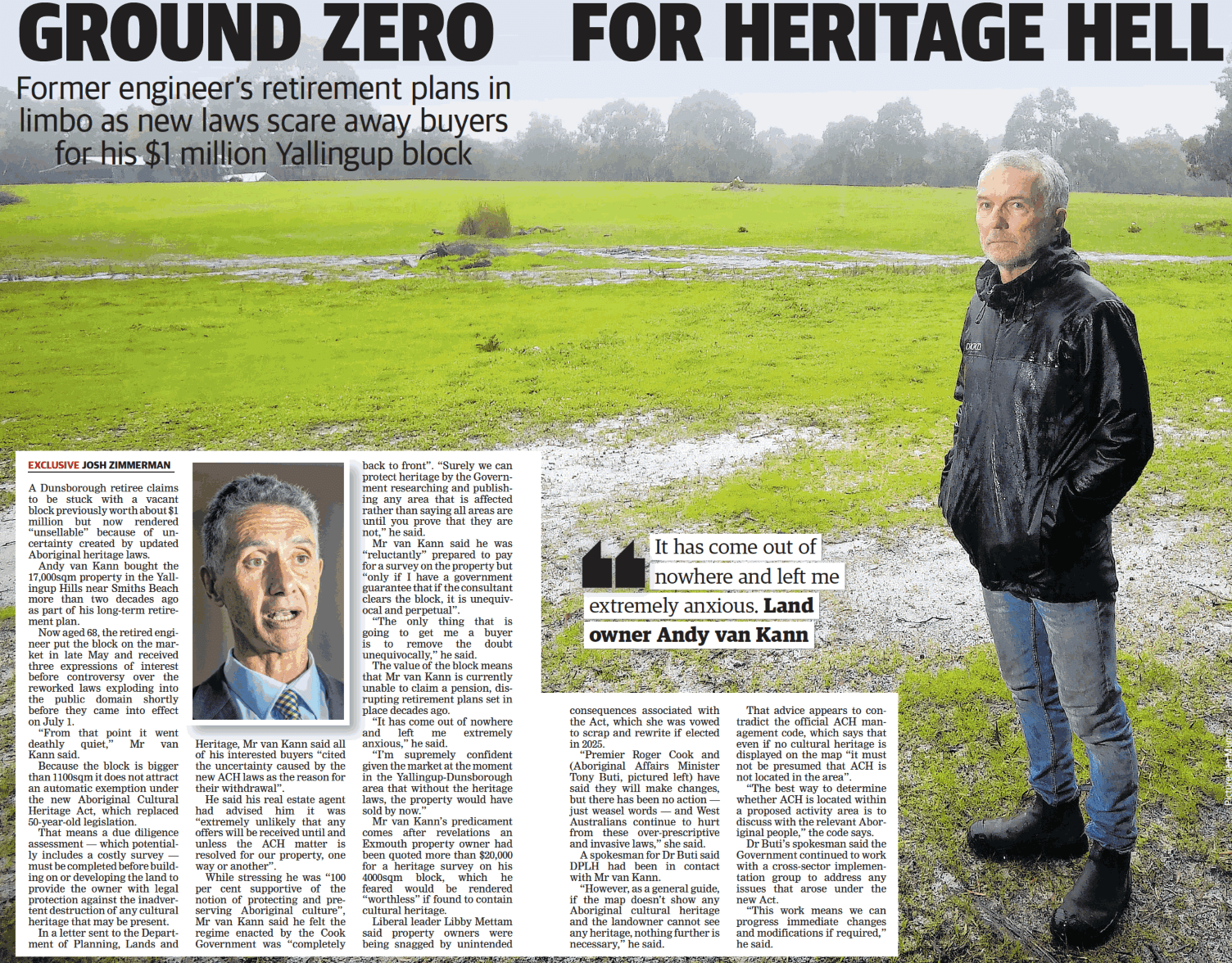
Article by Josh Zimmerman courtesy of the West Australian.
Former engineer’s retirement plans in limbo as new laws scare away buyers for his $1 million Yallingup block
A Dunsborough retiree claims to be stuck with a vacant block previously worth about $1 million but now rendered “unsellable” because of uncertainty created by updated Aboriginal heritage laws.
Andy van Kann bought the 17,000sqm property in the Yallingup Hills near Smiths Beach more than two decades ago as part of his long-term retirement plan.
Now aged 68, the retired engineer put the block on the market in late May and received three expressions of interest before controversy over the reworked laws exploding into the public domain shortly before they came into effect on July 1.
“From that point it went deathly quiet,” Mr van Kann said.
Because the block is bigger than 1100sqm it does not attract an automatic exemption under the new Aboriginal Cultural Heritage Act, which replaced 50-year-old legislation.
That means a due diligence assessment — which potentially includes a costly survey — must be completed before building on or developing the land to provide the owner with legal protection against the inadvertent destruction of any cultural heritage that may be present.
In a letter sent to the Department of Planning, Lands and Heritage, Mr van Kann said all of his interested buyers “cited the uncertainty caused by the new ACH laws as the reason for their withdrawal”.
He said his real estate agent had advised him it was “extremely unlikely that any offers will be received until and unless the ACH matter is resolved for our property, one way or another”.
While stressing he was “100 per cent supportive of the notion of protecting and preserving Aboriginal culture”, Mr van Kann said he felt the regime enacted by the Cook Government was “completely back to front”. “Surely we can protect heritage by the Government researching and publishing any area that is affected rather than saying all areas are until you prove that they are not,” he said.
Mr van Kann said he was “reluctantly” prepared to pay for a survey on the property but “only if I have a government guarantee that if the consultant clears the block, it is unequivocal and perpetual”.
“The only thing that is going to get me a buyer is to remove the doubt unequivocally,” he said.
The value of the block means that Mr van Kann is currently unable to claim a pension, disrupting retirement plans set in place decades ago.
“It has come out of nowhere and left me extremely anxious,” he said.
“I’m supremely confident given the market at the moment in the Yallingup-Dunsborough area that without the heritage laws, the property would have sold by now.”
Mr van Kann’s predicament comes after revelations an Exmouth property owner had been quoted more than $20,000 for a heritage survey on his 4000sqm block, which he feared would be rendered “worthless” if found to contain cultural heritage.
Liberal leader Libby Mettam said property owners were being snagged by unintended consequences associated with the Act, which she was vowed to scrap and rewrite if elected in 2025.
“Premier Roger Cook and (Aboriginal Affairs Minister Tony Buti, pictured left) have said they will make changes, but there has been no action — just weasel words — and West Australians continue to hurt from these over-prescriptive and invasive laws,” she said.
A spokesman for Dr Buti said DPLH had been in contact with Mr van Kann.
“However, as a general guide, if the map doesn’t show any Aboriginal cultural heritage and the landowner cannot see any heritage, nothing further is necessary,” he said.
That advice appears to contradict the official ACH management code, which says that even if no cultural heritage is displayed on the map “it must not be presumed that ACH is not located in the area”.
“The best way to determine whether ACH is located within a proposed activity area is to discuss with the relevant Aboriginal people,” the code says.
Dr Buti’s spokesman said the Government continued to work with a cross-sector implementation group to address any issues that arose under the new Act.
“This work means we can progress immediate changes and modifications if required,” he said.
















